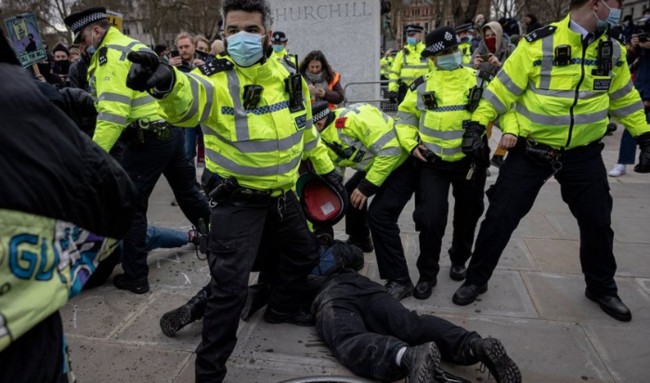Is it time for checks and balances on police who abuse their powers?

Police at one of the Easter Saturday ‘Kill the Bill’ demonstrations: who do you think is being violent here?
It seems police across the UK have been abusing their powers to control protests for many years – so why do our governments only ever seem to give them more powers to abuse?
This article by Christine Berry expands on one This Site publicised a few days ago, discussing instances going back 13 or 14 years in which police behaviour fell far below the expected standard.
And the similarities tell us that they should have been stopped long ago.
Consider the opening paragraphs:
After someone suffers an untimely death at the hands of a Metropolitan Police officer, a vigil is held in London. Footage goes viral of a woman being physically attacked by Met officers at the vigil, but senior figures insist it was just good public order policing. Around the same time, it’s revealed that police lied about officers being injured at a separate protest. Public trust in policing is battered, but somehow, politicians still think it’s a good idea to give them more powers.
No, this isn’t 2021. It’s 2008-’09. The dead man is Ian Tomlinson, a bystander at the G20 protests who was hit with a baton and pushed to the ground. The woman is Nicola Fisher. And those ‘injuries’? ‘Six insect bites and a toothache,’ as the Guardian put it – sustained at the Kingsnorth Camp for Climate Action.
We see that, even then, the police were using the media to alter public perception of protests, with claims that their violence was “good public order policing” and with false claims of injuries suffered by officers.
The summer before, I’d joined the Heathrow Climate Camp – which saw a step change in police repression of protest, including kettling, mass searching, surveillance, and physical attacks.
So this was when these tactics were introduced. Under the New Labour government of Gordon Brown, notice.
I was advised that volunteering as a legal observer might give me a degree of protection: ‘They seem to respect the hi-vis jacket.’ Instead, the opposite happened, with legal observers expressly targeted for intimidation.
Footage of recent protests has shown police singling out observers and members of the press. It seems they don’t like it when their violence is witnessed. Neither do criminals; I make the observation in passing.
Going back to 2008:
When we raised questions about police abuse of power, the Minister for Policing responded that 70 officers had been injured at the protest. The implication was that the climate campers were a violent mob, and attacking them with batons was a proportionate response.
We heard the same last month…
Not a single officer had been injured by a protester. Instead, bizarre entries like ‘stung on finger by possible wasp’ ensured that the story went viral, and the Minister was forced to apologise for misleading Parliament.
… again, the injuries mentioned last month also proved unconnected – or simply false.
The conclusion is clear:
Smearing protesters as violent is a consistent and deliberate strategy employed by the police to justify their own aggressive tactics and suppress criticism.
Perhaps it is time to impose a rule – that police should only be allowed to make such claims if they are able to support them, immediately, with independently-verified proof.
Here’s another tactic:
In the run-up to the G20 [protests], Met Commander Bob Broadhurst had talked up the prospect of violence, so the media and the public were primed to believe his version of events.
He did the same before the student protests of 2010, imploring parents to ‘talk to their children and make sure they’re aware of the potential dangers’, since there was ‘only so much police officers can do’ to protect them from violent yobs hijacking demonstrations: yobs, presumably, like the officer who hit Alfie Meadows over the head with a baton, and left him bleeding into his brain.
So perhaps police representatives should be restrained from such “priming” – or at the very least, the press should challenge them to demonstrate their reasons for making such claims.
The following year, over 100 UK Uncut protesters were lured out of Fortnum and Mason on false pretences and arrested for aggravated trespass.
Yvette Cooper gave the police her full-throated support in bringing ‘the full force of the law’ down on the ‘few hundred mindless idiots and thugs’ who had supposedly attacked people and property. In fact, less than a dozen people had been charged with violent offences. And all the Fortnum and Mason prosecutions were subsequently dropped.
But nobody at the police faced any criticism over the tactics they used or the lies they told.
This cyclical pattern creates a climate of impunity where the police are in a no-lose situation. If protests pass off peacefully, they are praised for handling them well. If they don’t, the violence is blamed on the people they are beating up. The very fact of protestors’ repression is treated as proof they were engaged in violence: the police ‘must have had a reason’.
This is victim-blaming.
Here is a direct example of it:
In the days around the G20 protests… the Home Affairs Select Committee conducted an inquiry, but they gave Nicola Fisher a much harder time than Bob Broadhurst – insinuating that she’d ‘asked for it’ by instinctively pushing back when a police officer first shoved her, and asking how much she’d got for selling her story.
Press challenges to the police narrative, it seems, are met with the threat of a costly court battle:
Climate Camp occupied Bishopsgate … announcing at the outset that the occupation would last 24 hours…. I started getting panicked phone calls from friends who were kettled there, pleading for our help. The police were advancing on them with dogs, batons and riot shields. People were being punched, dragged, and thrown for no reason.
Feeling helpless, I rang my boss, who eventually managed to speak to Bob Broadhurst’s deputy, Ian Thomas. He asked Thomas what the hell he thought he was doing, making clear that he thought the action was unlawful. The response was effectively: see you in court.
We know (don’t we? This Writer certainly understands how it works) that civil court action in the UK is a lengthy and costly process. The police have the infinite resources of the state to support them; the press do not. It seems, then, that if faced with the consequences of their actions, they are happy to buy justice.
And now we have a new Police, Crime, Sentencing and Courts Bill that hands new powers to the police without imposing any of the checks and balances that are needed to stop them behaving like criminals.
Patel’s response to policing that oversteps legal powers is simply to ratchet up the powers. They no longer need to worry about how much ‘disruption’ justifies violently dispersing a protest: now, the threshold will effectively be zero.
They no longer need to worry about proving aggravated trespass: now, all trespass will be criminal anyway. She is giving them the impunity they have always wanted.
This should worry us all. As this history shows, a right to protest that stops when the Met says so is no right at all.
So it seems the police have been acting as politicians’ paid thugs for many years (decades, in fact – look at the disgraceful way police were used as political weapons during the Miners’ Strike of 1984-5).
Faced with evidence of criminal behaviour by men in police uniforms, our government has chosen not to impose curbs, but to change the law so their thuggery becomes legal – putting the police in a class above the rest of us.
It means that you will have no rights at all in any dealings you have with the police. They will be able to do anything they want with you, or to you, with impunity.
Remember that in some cases this includes committing crimes such as murder and rape, thanks to a law the Tories brought in a few months ago.
If you voted Tory in 2019, it’s what you wanted. Own it.
But even if you did, that doesn’t mean you should accept it. If you now understand that you made a mistake, you’d better do something about it.
Because this repression will only get worse.
Source: How Protestors Get the Blame for Police Violence
Have YOU donated to my crowdfunding appeal, raising funds to fight false libel claims by TV celebrities who should know better? These court cases cost a lot of money so every penny will help ensure that wealth doesn’t beat justice.
Vox Political needs your help!
If you want to support this site
(but don’t want to give your money to advertisers)
you can make a one-off donation here:
Here are four ways to be sure you’re among the first to know what’s going on.
1) Register with us by clicking on ‘Subscribe’ (in the left margin). You can then receive notifications of every new article that is posted here.
2) Follow VP on Twitter @VoxPolitical
3) Like the Facebook page at https://www.facebook.com/VoxPolitical/
Join the Vox Political Facebook page.
4) You could even make Vox Political your homepage at http://voxpoliticalonline.com
And do share with your family and friends – so they don’t miss out!
If you have appreciated this article, don’t forget to share it using the buttons at the bottom of this page. Politics is about everybody – so let’s try to get everybody involved!
Buy Vox Political books so we can continue
fighting for the facts.
The Livingstone Presumption is now available
in either print or eBook format here:
Health Warning: Government! is now available
in either print or eBook format here:
The first collection, Strong Words and Hard Times,
is still available in either print or eBook format here:









Banning the Met from policing large crowds would be a start. Successive Tory “governments” have used the Met as their own private army frequently. Remember, the miners’ strike was peaceful until the Met showed up. Same thing at the Vigil: sunset and out come the police provocateurs and the Met bullies.
Don’t forget trainee police officers take turns at college being “rioters” and “riot control”. They know what to do, don’t they?
i do not agree with his political views but this is an example
https://youtu.be/VhBVoU2VF7Y
Back in the days when ‘kettling’ first became a thing we did see footage on national news programmes of the protests and of how that played out – although not in great detail. The TV news ALWAYS distorted the truth – think back to the edited film from the Miner’s Strike. They showed Miners attacking police and then the police doing a mounted charge to defend themselves. It was years before the truth was accepted that the POLICE attacked the Miners who were peacefully protesting and THEY tried to defend themselves from the police attack. I knew many who were there (on the police side) They saw a lot which made them ashamed. They saw lots of officers with no badges who seemed not to know much about policing, they suspected that certain Army Groups had been brought in, put in uniforms and essentially told to attack.
But NOW – there’s never any footage on TV that could possibly contradict the police version. Given the amount of phones that film these things I assume that this is a deliberate tactic to avoid showing protests at all. In fact I remember the BBC being asked to stop filming (live report) as there was a protest outside. They weren’t asked to leave, they were TOLD to STOP FILMING. Whatever we don’t know about we cannot protest against. I’ve heard it said most Chinese people don’t even know who the Uighurs are – seems we are headed in the same direction..